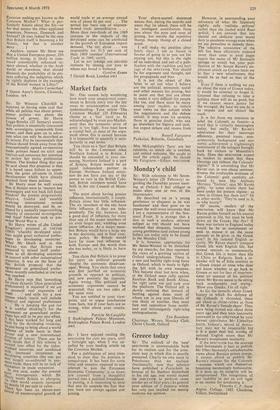Market facts
Sir: One cannot help wondering how much your unequivocal oppo- sition to British entry into the EEC owes to misconception and mis- understanding. Your article 'The Common Market' (20 February) claims as a 'fact' (said to be acknowledged by even pro-Market- eers) that the economic price of entry is 'too high'. You must have a crystal ball, as most of the argu- ment about this is caused because it is impossible to quantify it satis- factorily in real terms.
You claim as a 'fact' that Britain will be to the Continent what Northern Ireland is to Britain. I should be interested in your rea- soning. Northern Ireland is a part of Britain.; Britain would be an equal independent partner in Europe. Northern Ireland minis- ters do not have any say or the power to veto in the British Cabi- net; British ministers would have both in the EEC Council of Minis- ters.
The point about having greater influence, internationally, is simple. Britain alone has little influence. The six members of the EEC have little influence if they act inde- pendently. The EEC, however, has a good deal of influence, far more than one of the major members of an even larger EEC, wielding even more influence. As a major mem- ber, Britain would have a large say in EEC decisions, and in final com- mon policy. So Britain would have far more real influence in both Europe and the world than she has today, or is likely to have alone.
You claim that Britain is to press for entry on political grounds .'despite the economic disadvant- ages'. Wrong. You claim that entry was first justified on economic grounds as opposed to political, and now precisely the opposite. Again wrong. The political and economic arguments cannot be separated; they are two sides of the same coin.
You are entitled to your view- point, and to argue conclusions from facts, but if your facts are so wrong, what about your conclu- sions?
Patricia McLaughlin 2 Buckingham Palace Mansions, Buckingham Palace Road, London swl


































 Previous page
Previous page